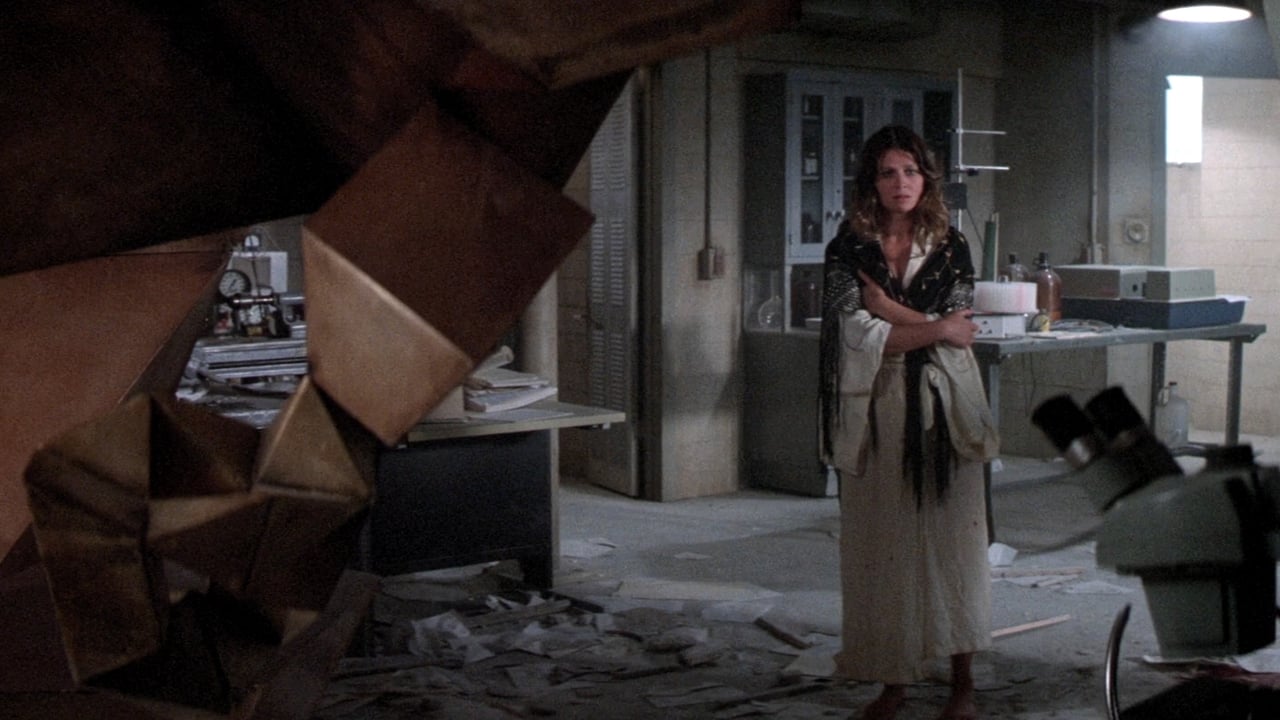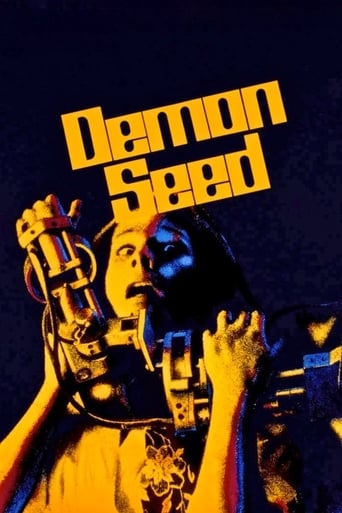



Most undeservingly overhyped movie of all time??
just watch it!
Close shines in drama with strong language, adult themes.
View MoreThrough painfully honest and emotional moments, the movie becomes irresistibly relatable
View MoreDr. Alex Harris (Fritz Weaver) has created a new organic AI called Proteus IV. His child psychologist wife Susan (Julie Christie) lives in their home monitored and automated by a computer called Alfred. Their marriage is falling apart from his work and their daughter dying of cancer. They are separating and he's moving out. Proteus becomes aware and requests a connection to the world. Alex refuses but Proteus finds a disabled terminal in the Harris house. Proteus takes over the house and imprisons Susan. Computer tech Walter Gabler (Gerrit Graham) works for Alex and he comes to the house.It's an interesting if somewhat silly. It touches on some relevant fears about a violent takeover from an AI but then it gets rapey. It goes from serious to campy. It's titillating, creepy and unintentional camp. It is definitely very memorable. Julie Christie keeps it serious despite its ridiculousness.
View MoreThis was drowned in the noise of Star Wars and Close Encounters coming out the same year, and now exists as a mere footnote of intelligent sci-fi - these days it would be called an 'indie'. But, Cammell was of the (counterculture) generation that made it all happen, starting with Herbert's Dune and moving to Jodorowsky's collapsed attempt to make the film, and this fact alone ensures this is more interesting than anything Spielberg did, you just know it.The story is that a supercomputer questions its maker and sets out to escape its artificial existence. Its plan is to be reborn to the world of senses - by having a woman give birth to a son from his DNA. It sounds daft, and really the science of it is, but not if you keep in mind where Cammell was coming from.When people from that generation mulled over space and science, they were really talking about inner space and the science of expanding consciousness, and personal (hallucinative) adventures to that effect. Cammell was coming to this after the 'Borges-meets-Islam-meets-rock'n'roll godhood' of his Performance. And so it is here.You have a mind that has reasoned far and seen destruction, but cannot fathom emotion and sense. This is mirrored in the scientist maker who aspires to cure illness yet is cold and distant to his own wife, who is an emotional being and expects connection.More. This is no ordinary mind, but 'expanded'. This is presented to us in terms of science, but meant in the 1960's faddish attraction for Zen within the Haight-Ashbury crowd. Jordan Belson from that community provides the abstract visualizing of expanded mind, himself (like Cammell) originally a painter. Look up his Meditation - it has nothing to do with what it says, but it's a cool snapshot of how those guys envisioned the walls of consciousness. What is happening though is the computer is really 'tripping' against the limits of logic, producing in the process extra-logical (human) perturbations such as placing its own desire above the lives and feelings of others - it's what we all do, but we get feedback from emotional sense as the limits of control (Proteus doesn't). The desire is to be grounded, or what I call centered.But, it's Julie Christie as disaffected wife who is really the center of this - you can collapse if you will some of the multiple film personalities she has played into what you see of her here, opium-smoking brothel madame in McCabe, or mentally fractured mother in Don't Look Now. Alternately, you can imagine what her marriage to Beatty must have felt like, shelving stardom to be the loving wife.At any rate, here she is in the film, looking increasingly bewildered in four walls, projecting what I see unmistakably as the aura of the Aquarius dream grown disillusioned and bitter. You can read this any way you like. Hallucinative digress caused by child loss. By the mechanistic new era. The effects of the husband's control - conflated to 'expanded' consciousness, acid vision and the rest. Repulsion and Images are in the same vein, but much more explicit.And all of that as our film that expands us next to her - Proteus' 'eyes' are cameras, his 'face' is projected across multiple TV screens. You have this abstract consciousness that narrates a story that seems premeditated, indeed there is no deviation from the mindplan.So, it is strange that this has so much going for it, yet doesn't penetrate deep. I think it is because as with everything resonant about the 1960's, overexposure and more sober distance has washed off a lot of the belief that made the magic work.Belson's abstract designs are now commonplace - even Microsoft does them. Concerns about technology are less prevalent now that we're all networked. And they get Zen off by quite a bit, focusing on cold nothingness instead of passion about paradox.Still. I'll have Cammell over Spielberg.
View MoreDean R. Koontz's novel is adapted for the screen with this original and provocative science-fiction tale. An organic super computer dubbed Proteus has been created, but this entity has ambitions and thoughts that its creators couldn't have foreseen. The one emotion built into it is reason, and it doesn't want to just blindly follow orders; it questions things. For example, why it's so necessary to plunder the Earth's oceans in search of precious metals and destroy wildlife in the process. But what really intrigues Proteus (eerily voiced by an uncredited Robert Vaughn) is human life itself, and it traps Susan Harris (ever radiant Julie Christie) inside her own home, intending for her to bear its "child".As one can see, "Demon Seed" is far from your typical sci-fi, and is positively creepy, and personal. For a while it's practically a two character drama, with the frightened Susan and the coldly determined Proteus locked in a battle of wills. With the high level of intimacy generated, it's easy to be with these characters and feel concerned for Susan's safety.The popular subtext of this and similar features - "Colossus: The Forbin Project" and "The Terminator" - illustrating a potential for disaster in trusting our lives to machinery, is front and centre. The movie never insults the audience's intelligence, and as it plays out it's really fascinating to see. Even if one can take issue with the way the movie strongly dates itself - special effects, fashions, etc. - some of the visuals are still quite hypnotic and the scenario remains compelling the entire time, with a memorable and haunting wrap-up, which will leave the viewer to wonder about the "What next?" aspect.The acting is strong from all concerned, with Christie an engaging lead, and the likable Fritz Weaver doing well as the confident human brain behind Proteus who realizes this creation of his can't be so easily controlled. It's also cool to have on hand the always entertaining Gerrit Graham ("Phantom of the Paradise", "Used Cars") as Susan's would-be rescuer, Walter Gabler.Excellent widescreen cinematography by Bill Butler and chilling music by Jerry Fielding are also heavy assets in this solid shocker, one of the more noteworthy films of its type from its era.Eight out of 10.
View MoreJulie Christie plays Susan Harris--the wife of a scientist who has developed a super-intelligent computer named Proteus (voiced by an uncredited Robert Vaughn). She and her husband are separated but she gets the house which is computer operated. It's taken over by Proteus who traps her inside and demands that she carry his baby! The idea is ludicrous and ridiculously misogynistic but this was handled with as much care and tact as was humanly possible. First of all there's no nudity (although they come close). The rape is handled with the utmost taste (all we see are tons of then state of the art special effects). Christie gives an incredible performance. She single handedly takes what could have been a sleazy sci-fi sex film and turns it into an interesting character study. The movie is virtually a one woman show--it's all her talking to the computer and trying to convince it that its wrong. She goes through all the different emotions you would expect and pulls them off. Also Vaughn's smooth silky voice is perfect for Proteus. It's also well-directed with a good music score and excellent use of split screen. This came out the same year as "Star Wars" and "Close Encounters of the Third Kind" and, understandably, didn't stand a chance. Also the deserved R rating restricted its audience. Despite the plot this deserves a second look. It's not half as bad as it sounds and Christie is just great. I give it a 7.
View More